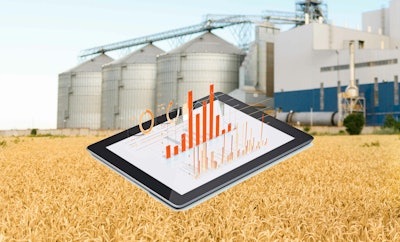
Over 50 years ago automation was first introduced into feed mills. Automation was initially used to control the batch process for a more efficient use of ingredients and to shorten the time to batch the ingredients. The number of ingredients were manageable, and formulations were much simpler. Production orders were printed out and confirmed manually that the right ingredients and quantities were used in each batch to complete the formulation. Inventory usage was manually entered into an accounting system and invoices were manually generated.
Feed mill automation has come a long way since that time to meet the never-ending need of continuous improvement to produce more feed, more safely with better profit. Feed mills will continue to evolve rapidly over the next 10 years as new technology enters the industry to collect and manage more data to make fact-based decisions that drive process improvements and long-term continuous improvement. The key to success for your feed mill is to recognize the important trends in your process or operations data, implement the right change at the right time and keep your mill ahead of the game and your competition.
Change is Coming
With the advent of Industry 4.0, feed mills will become smarter as the need to better manage sustainability and carbon footprint will require more data to identify plant wide improvements and process management. Over the past decade the cost of technologies such as sensors have drastically decreased in price making it cost effective to manage any part of a process. Increasing profitability and maintaining regulatory compliance is here to stay.
So, you might ask, “I collect a lot of data through my control system today and don’t have time to look at it all, why would I want to collect more”. The answer is data is useful when it can be viewed in an organized fashion to provide answers to questions surrounding compliance, productivity, safety, quality, and long-term profitability. This is where a Manufacturing Execution System (MES) comes into play, it turns giga-bytes of data into useful information.
What is MES?
MES can be defined as a system to manage, monitor, and synchronize the execution of real-time physical processes involved in transforming raw materials into intermediate work-in- process and then finished goods. They coordinate the execution of work orders with production scheduling and enterprise-level systems.
MES was designed to provide flexibility between the interfaces that make up the production process and the management of reporting using analytic tools and dashboards. Specifically, MES focuses on digitally logging events as they occur. MES logs the flow of each step within your production process including receiving, grinding, batching, pelleting, material transfer, loadout, warehouse, and order fulfilment confirmation. MES also interfaces with other systems in your organization to move data up and down as directed by your operation.
What is Integrated MES?
Integrated MES is an MES fully integrated with your control system PLC. The benefit of an integrated MES is transactional and production data, as well as equipment data, are stored in the same database. Connecting all the various types of data collected in your feed mill allows easy and concise reporting from one source. An Integrated MES solution is typically most cost effective when provided by your control system integrator.
What Can an Integrated MES Do for My Feed Mill?
An MES confirms that processes are executed consistently by executing the same way every time eliminating variations known to bring about issues with safety and quality for feed production.
By monitoring your entire process, in real-time, you can reduce the risks in various parts of your operational flow, such as downtime, incorrect ingredient usage and mechanical issues to name a few. MES brings the value of identifying issues immediately with the ability to correct them before they result in a serious problem that becomes costly.
Elimination of Waste: When you improve the flow of your process, you can easily eliminate many forms of waste, from work-in-process (WIP) inventory to idle time with machines. MES provides complete visibility where bottlenecks occur and the importance of synchronized processes. Increase through put and Improve profitability of your mill.
System Compatibility: MES integration brings the ability to connect standalone equipment and software such as ERP’s to communicate and exchange data. Reduce paper reports and manual data entry.
AssureQuality: MES can assure quality standards are being met throughout the production process. If an ingredient is in question, or a batch is recalled, an MES can help to quickly locate and isolate the issue down to each ingredient and lot code. With greater control comes greater quality and less rework,
Assure Compliance:MES provides support to FSMA documentation for your (Current Good Manufacturing Processes (cGMP’s), Hazard Analysis Critical Control Points (HACCP) and Hazard Analysis and Risk Based Preventative Control (HARBP).
CostSavings: MES helps provide a synchronized path for both raw materials and machines to produce efficiently made feed on-time. With MES, manuals systems and spreadsheets are no longer needed. It enables a feed mill to operate with fewer people which addresses labor shortages and provides reduced overhead and fixed costs.
Getting Started
Some smaller Feed Mills may feel like their business is too small, or that the software is too expensive or complex to adopt. MES is flexible enough for small and large Feed Mills. MES is especially beneficial to companies with multiple feed mills looking to integrate best practices across the enterprise. MES can be implemented incrementally making it cost effective for most annual process improvement budgets to get started. Focus on the area that can provide an immediate improvement return and expand the implementation to other area of the mill to capture additional improvements.
WEM Automation – Over 65 Years of Industry Experience
At WEM Automation, precise automation and process controls meet superior integrated data management. Developing successful applications of innovative technology is at the core of our commitment to continual product improvement.
WEM engineered solutions are flexible, innovative, and performance driven to sustain a 99.6% uptime. With our smarter data integration approach, data is delivered in real-time into streamlined, fully traceable, and fully compliant integrated reports.
Our future forward mindset solutions are focused to exceed operational excellence goals in safety, quality, reliability, and efficiency. 24/7/365, our customer support team is dedicated to your business and whatever needs and issues arise. We are always there for our customers!




